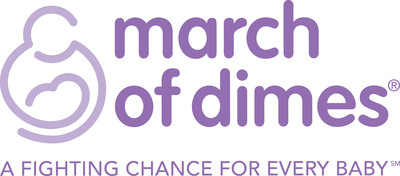WHITE PLAINS, N.Y., March 2, 2017 /PRNewswire-HISPANIC PR WIRE/ — March of Dimes officials responded today to a new government report showing that brain abnormalities or microcephaly has occurred about 33 times as often in the United States since the arrival of Zika virus in the Americas.

“This study makes clear the grave consequences of Zika infection for pregnant women and their babies,” says Paul E. Jarris, MD, MBA, chief medical officer of the March of Dimes. “The dramatic increase in microcephaly and other birth defects caused by Zika should be a wake-up call for anyone who thinks Zika is no longer a serious threat. We must take all necessary measures to prevent, diagnose and treat Zika infection.”
The report, published in Morbidity & Mortality Weekly Report from the Centers for Disease Control and Prevention (CDC), includes data from birth defects surveillance programs in Massachusetts, North Carolina, and Atlanta, Georgia, to assess the prevalence of Zika-related birth defects during the years 2013-2014 (before the arrival of Zika). Previously published data from the U.S. Zika Pregnancy Registry for 2016 estimated that these conditions occurred in about 59 out of every 1,000 infants born after Zika infection during pregnancy. Despite ascertainment differences in the two studies, results from the study published today indicate a Zika-related birth defects prevalence rate that is about 20 times the rate during the pre-Zika years. A larger difference was observed for brain abnormalities and/or microcephaly (smaller than expected head), which occurred about 33 times as often in pregnancies with Zika infections than in the pre-Zika years.
Dr. Jarris noted that the March of Dimes and CDC are providing a coordinated effort to fight Zika and help affected families in many key areas, including hosting and promoting “Zika Care Connect,” a new website that will launch in April 2017 to assist Zika-affected families in finding healthcare professionals around the country who can provide specialized care.
Other activities include:
- Providing continuing education for nurses on “What Every Nurse Should Know” about Zika in both English and Spanish.
- Preparing Zika Prevention Kits for newborns in Puerto Rico (including mosquito netting, onesies and prevention tips).
- Providing up-to-the-minute information in English and Spanish for women, men, and families at ZAPzika.org and nacersano.org/zika.
“Everyone, especially pregnant women and women who may become pregnant, and their partners, must know the steps they can take to protect themselves from Zika infection,” Dr. Jarris says.
The March of Dimes also answers questions about Zika virus in social media and via email in both English and Spanish. Send email to [email protected] or [email protected].
Zika infection during pregnancy can cause congenital Zika syndrome, a group of health conditions present at birth associated with Zika infection during pregnancy, which includes birth defects such as microcephaly and other serious problems, including hearing loss, nervous system problems and vision problems. Zika infection during pregnancy also has been linked to miscarriage and stillbirth. The full range of effects of congenital Zika infection is not known, CDC says.
The report, “Baseline Prevalence of Birth Defects Associated with Congenital Zika Virus Infection — Massachusetts, North Carolina, and Atlanta, Georgia, 2013–2014,” by Janet D. Cragan et al. will appear March 3 in Morbidity & Mortality Weekly Report.
The March of Dimes is the leading nonprofit organization for pregnancy and baby health. For more than 75 years, moms and babies have benefited from March of Dimes research, education, vaccines, and breakthroughs. For the latest resources and health information, visit our websites marchofdimes.org and nacersano.org. For detailed national, state and local perinatal statistics, visit peristats.org. You can also find us on Facebook or follow us on Instagram and Twitter.
Logo – http://mma.prnewswire.com/media/197662/modlogo_rgb_2_logo.jpg





